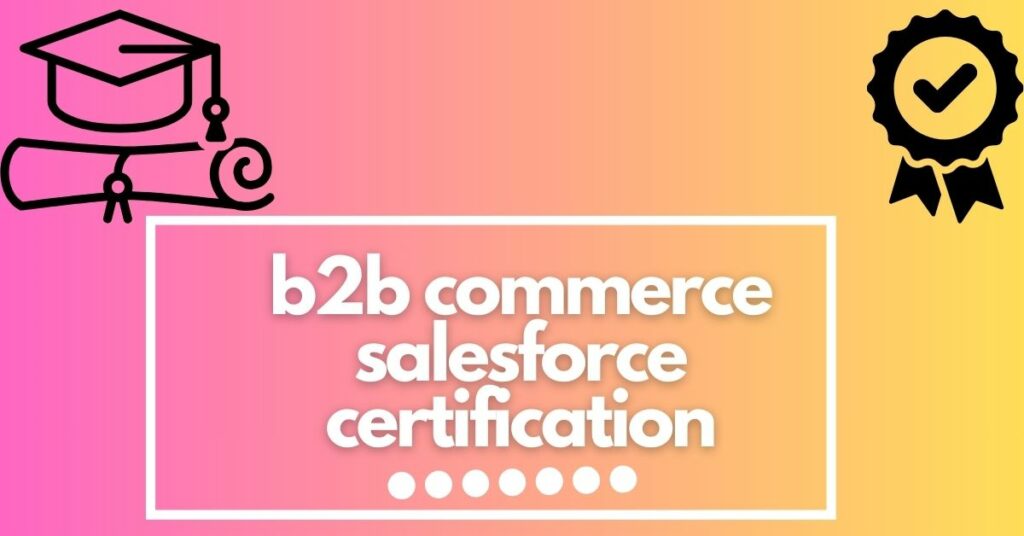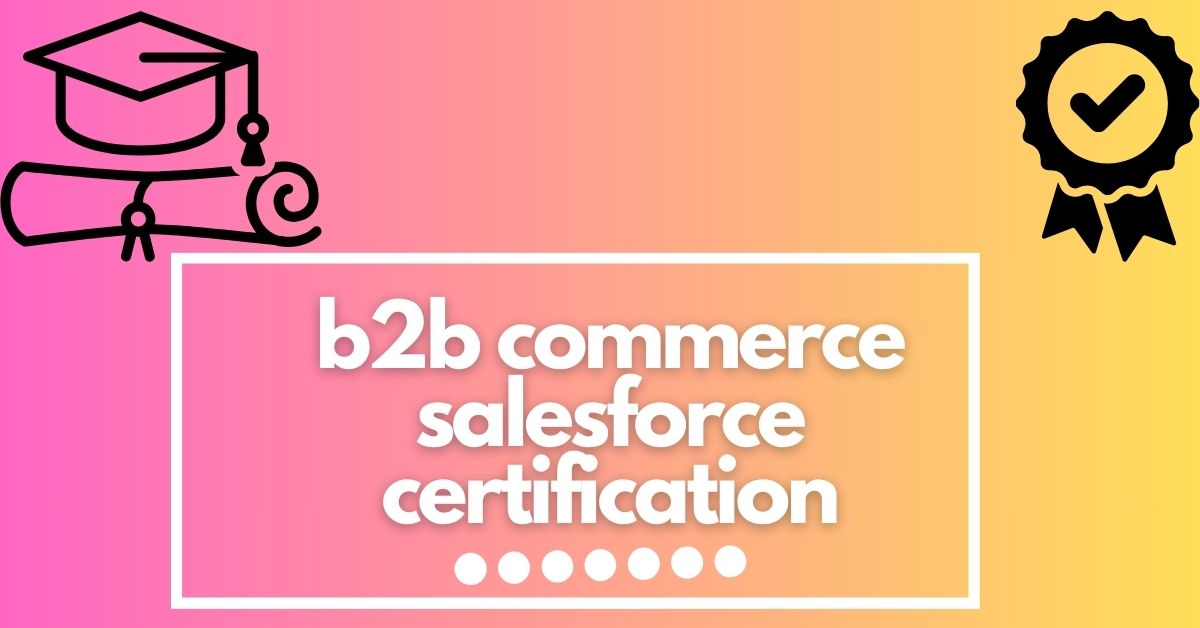Overview of B2B Commerce Salesforce Certification
The B2B Commerce Salesforce Certification provides professionals with the knowledge and skills needed to excel in the field of business-to-business (B2B) commerce. This certification covers a wide range of topics, including understanding the B2B commerce ecosystem, configuring and managing B2B commerce solutions, and optimizing the customer experience. Professionals who earn this certification demonstrate their expertise in implementing and managing B2B commerce solutions using Salesforce technology. This certification is ideal for individuals who work in sales, marketing, or customer service roles within B2B organizations.
The B2B Commerce Salesforce Certification is a valuable credential that can help professionals advance their careers and increase their earning potential. By obtaining this certification, professionals can showcase their proficiency in leveraging Salesforce technology to drive business growth and enhance the customer experience. Overall, the B2B Commerce Salesforce Certification is a comprehensive and reputable qualification that can open up new opportunities for professionals in the B2B commerce industry.
Importance of certification for sales professionals
Certification holds significant importance for B2B Commerce Salesforce Certification professionals in today’s competitive business landscape. Firstly, obtaining a certification in sales showcases a commitment to excellence and professionalism, setting individuals apart from their non-certified counterparts. It demonstrates a dedication to continuous learning and development within the sales industry, which is crucial for staying relevant and competitive in a rapidly evolving market.
Moreover, certification provides sales professionals with a solid foundation of knowledge and skills that are essential for success in sales roles. It equips individuals with the latest industry best practices, strategies, and techniques, empowering them to B2B Commerce Salesforce Certification perform at their best and achieve targets effectively. This expertise not only enhances job performance but also boosts confidence, credibility, and trust among clients and colleagues. Furthermore, certified sales professionals often enjoy greater career opportunities and advancement prospects.
Employers value certification as a tangible demonstration of expertise and competence, making certified individuals more desirable candidates for promotions and B2B Commerce Salesforce Certification leadership roles within organisations. Ultimately, certification serves as a valuable investment in one’s career, offering a pathway to personal growth, professional recognition, and long-term success in the dynamic field of sales.
Impact on sales strategy development
The impact on sales strategy development is profound B2B Commerce Salesforce Certification when considering the evolving dynamics of the modern business environment. Firstly, a well-crafted sales strategy is essential for aligning the efforts of the sales team with the overall business objectives. By defining clear goals, target markets, and tactics, a sales strategy provides a roadmap for achieving sustainable growth and success. Moreover, effective sales strategy development involves thorough market analysis and customer segmentation to identify opportunities and tailor approaches accordingly. This process enables businesses to understand their competitive landscape, customer needs, and industry trends, leading to more targeted and impactful sales initiatives.
Furthermore, a robust sales strategy encourages innovation and adaptability in response to changing market conditions and customer preferences. By continuously evaluating and refining the sales approach, organisations can stay ahead of the curve and remain competitive in a dynamic marketplace. Overall, the impact of sales strategy development is instrumental in B2B Commerce Salesforce Certification driving revenue growth, enhancing customer relationships, and maximising sales performance. A well-defined and agile sales strategy is a cornerstone of business success, guiding decision-making and empowering sales teams to achieve sustainable results in a rapidly evolving business landscape.
Enhancing customer relationship management
Enhancing customer relationship management (CRM) is paramount in fostering long-term loyalty and driving business growth. A robust CRM strategy B2B Commerce Salesforce Certification enables businesses to build and maintain strong relationships with customers by understanding their needs, preferences, and behaviours. By leveraging data and analytics, organisations can personalise interactions, anticipate customer requirements, and deliver tailored solutions, thereby enhancing customer satisfaction and retention.
Furthermore, effective CRM practices facilitate seamless communication and engagement across various touchpoints, ensuring consistent and meaningful interactions with customers. By implementing CRM systems and processes, businesses can streamline workflows, automate routine tasks, and improve the overall customer experience. This, in turn, leads to increased efficiency, productivity, and customer loyalty. Moreover, a customer-centric approach to CRM allows businesses to proactively address issues, resolve complaints, and exceed expectations, ultimately fostering a positive brand image and reputation.
By prioritising customer relationship management, organisations can differentiate themselves in a competitive marketplace, drive repeat business, and B2B Commerce Salesforce Certification cultivate brand advocates who play a crucial role in attracting new customers. In essence, enhancing CRM is vital for sustaining customer trust, loyalty, and advocacy, ultimately contributing to long-term business success.

Improving sales team productivity and efficiency
Improving sales team productivity and efficiency is B2B Commerce Salesforce Certification a critical objective for businesses aiming to maximise revenue and achieve sustainable growth. By implementing streamlined processes and leveraging technology, organisations can enhance the performance of their sales teams. Providing regular training and development opportunities equips sales professionals with the necessary skills and knowledge to excel in their roles, boosting overall productivity. Efficient sales team management involves setting clear goals, establishing performance metrics, and providing regular feedback to drive continuous improvement.
By fostering a culture of accountability and empowerment, businesses can motivate their sales teams to work towards common objectives and deliver results effectively. Moreover, leveraging data analytics and CRM systems enables businesses to track sales performance, identify trends, and make informed decisions to optimise sales strategies. By automating repetitive tasks and streamlining workflows, sales teams can focus on high-value activities, such as building relationships and closing deals, thus increasing B2B Commerce Salesforce Certification efficiency and driving revenue growth.
Overall, improving sales team productivity and efficiency requires a holistic approach that combines effective leadership, training, technology, and data-driven insights to empower sales professionals and drive success in a competitive marketplace.
Integration with existing sales tools and platforms
Integration with existing sales tools and platforms plays B2B Commerce Salesforce Certification a crucial role in enhancing operational efficiency and maximising the effectiveness of sales processes within organisations. By seamlessly connecting new technologies or software solutions with established sales tools, businesses can create a unified ecosystem that streamlines workflows and improves data accessibility.
Integrating new tools with existing platforms enables sales teams to leverage the combined functionalities of various systems, resulting in enhanced collaboration, productivity, and decision-making capabilities. This integration eliminates silos and data fragmentation, providing a comprehensive view of customer interactions and sales activities across B2B Commerce Salesforce Certification different touchpoints. Moreover, integrating sales tools allows for the automation of repetitive tasks, reducing manual effort and enabling sales professionals to focus on strategic activities that drive revenue and foster customer relationships.
By harnessing the power of integrated B2B Commerce Salesforce Certification platforms, businesses can gain valuable insights, improve forecasting accuracy, and deliver a more personalised and efficient sales experience to customers. In summary, seamless integration with existing sales tools and platforms is essential for creating a cohesive and efficient sales environment that empowers teams to achieve their targets and deliver exceptional results in a competitive business landscape.
Navigating the certification process
Navigating the certification process can be a B2B Commerce Salesforce Certification significant undertaking for professionals seeking to enhance their skills and credentials. The journey typically begins with thorough research to identify the most relevant certification programmes aligned with one’s career goals and industry requirements. Understanding the prerequisites, curriculum, and examination format of the certification is crucial in preparing for the process ahead. Once the desired certification is selected, individuals often embark on a structured study plan to cover the necessary material and acquire the knowledge and competencies required for success.
This may involve self-paced study, attending training courses, or engaging with online resources to deepen understanding and proficiency in the subject matter. Preparing for the certification exam involves rigorous practice, revising key concepts, and taking mock tests to assess readiness. Additionally, seeking guidance from mentors or joining study groups can provide valuable insights and support throughout B2B Commerce Salesforce Certification the preparation phase.
Upon completion of the certification exam, individuals await the results and, if successful, receive their certification, marking a significant achievement in their professional development. Navigating the certification process requires dedication, commitment, and a strategic approach to ensure a successful outcome and unlock new opportunities in one’s career journey.
Case studies of successful sales strategy transformations
Examining case studies of successful sales strategy transformations provides valuable insights into the strategies and practices that have led to significant growth and success for businesses. These case studies often highlight real-world examples of companies that have successfully revamped their sales approaches to adapt to changing market dynamics, customer preferences, or competitive landscapes. By analysing these case studies, professionals can gain a deeper understanding of the challenges faced by organisations, the strategies implemented to overcome obstacles, and the outcomes achieved through innovative sales strategies.
These success stories serve as inspiration and guidance for businesses looking to enhance their sales performance and drive revenue growth. Moreover, case studies of successful sales strategy transformations showcase the importance of agility, innovation, and customer-centricity in achieving sustainable success in sales.
They demonstrate how businesses have leveraged data, technology, and customer insights to refine their sales processes, improve customer engagement, and drive business results. Overall, studying successful sales strategy transformations through case studies provides valuable lessons and best practices that can inform and inspire businesses seeking to elevate their sales performance and achieve long-term success in a competitive marketplace.
